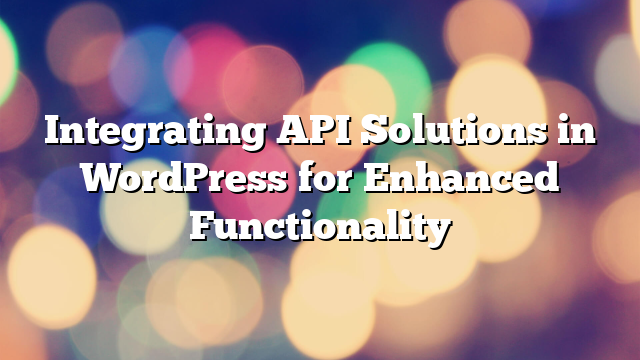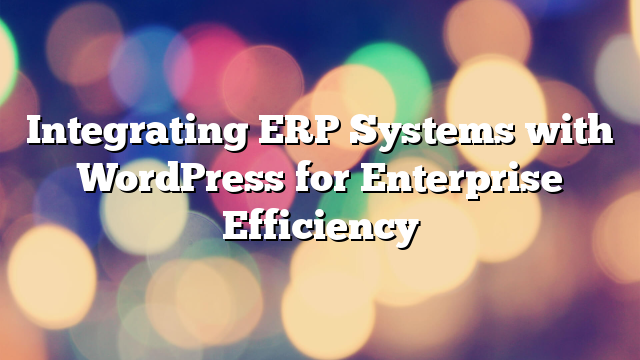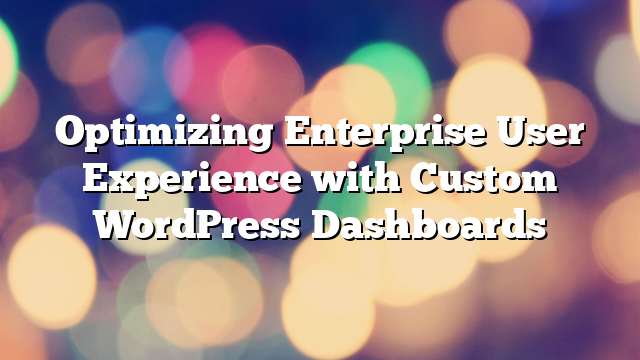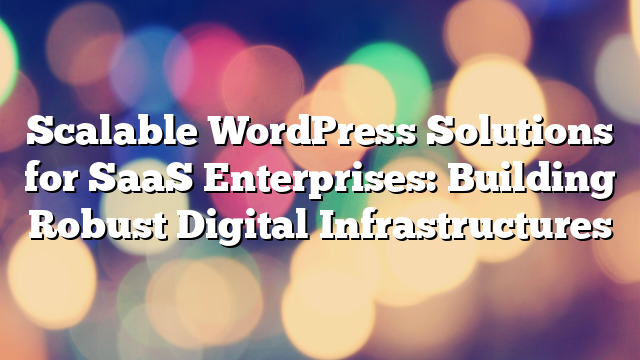Integrating API Solutions in WordPress for Enhanced Functionality
01.11.2024

As the digital landscape continues to evolve, integrating external services and applications with your website is becoming essential for delivering a seamless user experience. For enterprises utilizing WordPress as their primary content management system, API integration offers a powerful way to enhance site functionality, improve user engagement, and streamline backend processes. In this article, we’ll explore how API solutions can be integrated with WordPress to extend its capabilities and the benefits they offer to enterprise-level websites.
What is an API, and Why is it Important for WordPress?
API, or Application Programming Interface, is a set of protocols and tools that allow different software applications to communicate and share data. In the context of WordPress, APIs enable your website to connect with external applications, services, and databases, allowing you to leverage additional features without overloading your site.
For enterprises, API integrations provide opportunities to streamline workflows, integrate customer relationship management (CRM) systems, display real-time data, and much more. The flexibility and extensibility of WordPress make it ideal for API integrations, enabling companies to create customized, high-performing websites that cater to their unique needs.
Benefits of API Integration in WordPress for Enterprises
1. Enhanced Functionality and Features
API integration allows enterprises to add advanced functionalities to their WordPress websites without extensive development. By connecting to third-party services, you can incorporate features like interactive maps, live chat, weather updates, social media feeds, and more. This expanded functionality can significantly improve the user experience, making your site more engaging and useful for visitors.
2. Streamlined Data Management
For large organizations, managing vast amounts of data across various platforms can be challenging. APIs simplify data management by allowing seamless data exchange between WordPress and other systems, such as CRM or ERP software. This integration enables real-time updates, minimizing data redundancy and ensuring consistency across platforms, which is especially valuable for sales, marketing, and customer service teams.
3. Improved User Experience
API integrations can significantly enhance the user experience by providing real-time information and interactive features that engage users. For instance, APIs can be used to display real-time stock information, personalized content recommendations, or user-generated content like social media feeds. These integrations not only enhance the functionality of your WordPress site but also help keep users engaged and improve overall site satisfaction.
4. Increased Efficiency and Productivity
Automating tasks through API integration can free up time and resources for enterprise teams. By automating repetitive processes, such as data entry or email notifications, companies can focus on more strategic activities. For example, integrating a WordPress site with a CRM system allows for automatic data transfer, ensuring that sales and marketing teams have immediate access to customer information, thereby enhancing productivity and decision-making.
5. Scalability for Growing Needs
As your enterprise grows, so does the demand for new features and functionality. API integrations make WordPress highly scalable, allowing you to add new services and tools as needed. Whether you need to integrate payment gateways, analytics tools, or new marketing platforms, APIs enable your site to adapt to changing business requirements with ease.
Popular API Integrations for Enterprise WordPress Sites
1. CRM Integration
Customer relationship management (CRM) integration is crucial for businesses that want to centralize customer data. Popular CRMs like Salesforce, HubSpot, and Zoho provide APIs that connect seamlessly with WordPress, allowing data to flow between your website and CRM. This integration enables features such as lead capture forms, customer segmentation, and personalized marketing automation.
2. E-commerce and Payment Gateways
For businesses running e-commerce operations, integrating payment gateways and inventory management systems through APIs is essential. WordPress plugins like WooCommerce offer API options to connect with payment processors like PayPal, Stripe, and Square. Additionally, integrating with inventory and fulfillment services ensures that your stock levels are updated in real-time, reducing the risk of overselling and improving the customer experience.
3. Social Media APIs
Integrating social media platforms with WordPress allows you to display dynamic, user-generated content on your site. Facebook, Instagram, and Twitter offer APIs that allow you to showcase your social media feeds, embed posts, or enable users to log in with their social media credentials. This integration helps increase user engagement and extends your brand’s reach.
4. Analytics and Reporting
APIs from analytics platforms like Google Analytics or Adobe Analytics provide valuable insights into user behavior on your WordPress site. By connecting these APIs, enterprises can track KPIs, analyze traffic patterns, and gain insights into user preferences. Integrating analytics data into your WordPress dashboard can help your marketing and sales teams make data-driven decisions and optimize strategies for better results.
5. Marketing Automation
APIs from marketing automation tools such as Mailchimp, ActiveCampaign, or Marketo enable seamless integration with WordPress, allowing for automated email marketing, lead generation, and segmentation. These integrations help streamline marketing campaigns, improve personalization, and increase engagement through timely and targeted communications.
Best Practices for API Integration in WordPress
1. Choose Reliable APIs
When selecting APIs for integration, prioritize well-documented, reliable, and widely-used APIs. Opting for reputable providers reduces the risk of downtime or security issues and ensures that your integrations will be maintained and updated regularly. Well-established APIs also offer extensive support, which can be crucial for troubleshooting issues.
2. Optimize for Performance
API calls can impact website performance, so it’s essential to optimize your site to handle these interactions efficiently. Use caching strategies to minimize the number of API requests, and consider asynchronous loading for non-critical elements to prevent them from slowing down your site.
3. Prioritize Security
APIs can introduce vulnerabilities if not implemented securely. Use API keys, authentication tokens, and encryption to protect data exchanges between WordPress and external applications. Ensure that you follow industry best practices for secure API integration and monitor access logs regularly to detect any unauthorized access attempts.
4. Test and Monitor Integrations
Testing is crucial to ensure that APIs function as intended and do not conflict with other website components. Conduct thorough testing before deploying integrations on your live site, and use monitoring tools to track performance, uptime, and potential issues. Regularly update your APIs and maintain documentation to simplify troubleshooting and future modifications.
Conclusion
API integration in WordPress empowers enterprises to enhance site functionality, streamline operations, and deliver a better user experience. From CRM and analytics integration to social media and marketing automation, APIs provide the flexibility and scalability that enterprise websites need to remain competitive. By following best practices, enterprises can harness the power of API integrations to drive growth and improve efficiency.
If your organization is looking to leverage API integration to enhance your WordPress site, contact AllWebDev for expert support in implementing robust, secure API solutions tailored to your business needs.



